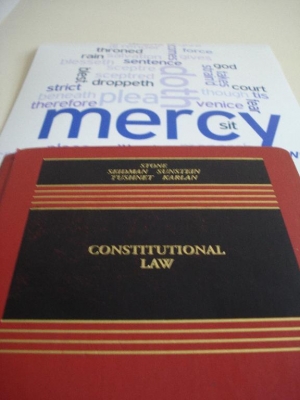

The First Amendment by Marshall Electric
August 31st, 2008 1:30 PMRights are conditional upon the system in which you live. there can be "inalienable rights," i.e., guaranteed contractually with your citizenship in a particular nation, membership in a particular group, etc, but they are conditional upon your involvement with that organization. Hobbes said such a covenant would have to be unbreakable in order to guarantee any sort of security.
With that in mind, and the title of this task weighing in on my mind as a student of the law eager to make a difference in the lives of city-dwellers (though perhaps not strongly enough to be a card-carrying member of HC), I thought I might call up HQ with three legal descriptions of natural rights (and with them responsibilities).

The first is a pretty simple one: the aforementioned First Amendment of the United States Constitution. In reading it, I'm exercising, ostensibly, the natural right ensured / protected / enshrined / whatevered in the document itself. As a citizen, it's an inalienable right, but not a natural one, and therefore insufficient for completing this task.
Contrast that with the second recording, the First Amendment to the Chinese Constitution of 1982, which is still binding despite having gone through four amendment processes, the first in 1988. It acts as a guarantor of a right that is still rather amorphous and young in China: not free speech but the "private economy."
The third is by some hack writer, Bill Shakespeare, in what is revealed by the end of the trial in which it is uttered as a surprisingly honest attempt to dissuade a plaintiff from valuing the letter of the law over the rights it purportedly guarantees and protects.
In comparing and contrasting these documents as to the value of rights and justice, I have been able to exercise the right to think as I want to think, which, I hope, hasn't been too dampened by all this legal wrangling. Speaking of exercise, I think I'll do a few tasks outside for awhile, get to know my new city a little better.
the first thing we do, let's kill all the lawyers.
-william shakespeare, "henry vi, part 2," act iv, scene ii
The First Amendment (US Constitution, 1791)
"Congress shall make no law respecting an establishment of religion, or prohibiting the free exercise thereof; or abridging the freedom of speech, or of the press; or the right of the people peaceably to assemble, and to petition the Government for a redress of grievances."
The First Amendment (Chinese Constitution, 1988)
"Article 11 of the Constitution shall include a new paragraph, which reads: 'The state permits the private sector of the economy to exist and develop within the limits prescribed by law. The private sector of the economy is a complement to the socialist public economy. The state protects the lawful rights and interests of the private sector of the economy, and exercises guidance, supervision and control over the private sector of the economy.' "
The Merchant of Venice, Act IV, Scene i
PORTIA: The quality of mercy is not strain'd, It droppeth as the gentle rain from heaven Upon the place beneath: it is twice blest; It blesseth him that gives and him that takes: 'Tis mightiest in the mightiest: it becomes The throned monarch better than his crown; His sceptre shows the force of temporal power, The attribute to awe and majesty, Wherein doth sit the dread and fear of kings; But mercy is above this sceptred sway; It is enthroned in the hearts of kings, It is an attribute to God himself; And earthly power doth then show likest God's When mercy seasons justice. Therefore, Jew, Though justice be thy plea, consider this, That, in the course of justice, none of us Should see salvation: we do pray for mercy; And that same prayer doth teach us all to render The deeds of mercy. I have spoke thus much To mitigate the justice of thy plea; Which if thou follow, this strict court of Venice Must needs give sentence 'gainst the merchant there.












Exercising your right to challenge the legitimacy of ordained rights, I like it.